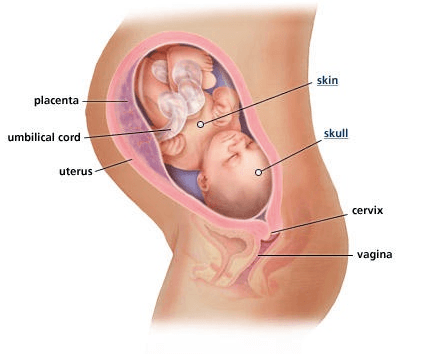Pregnancy at week 33 sometimes means the beginning of feeling you’ve arrived at the home stretch. For other moms, it marks the beginning of eternity for the last seven weeks (give or take) of pregnancy!
How big is your baby now?
By now, your baby is around four pounds and about the size of a pineapple! They have started to fill in with extra fat, so their wrinkles are rounding out nicely. Most babies will gain around a half a pound each week now.
The bones in their skull have not yet calcified together. This is for two purposes: For one, to allow the head to pass easily through the birth canal without damaging the brain and skull. The plates in the skull move against each other to provide the right shape to fit through. This is why babies are often born with a “cone-shaped” head. Likely, their head will take on a more spherical shape in a few short weeks after birth. The second purpose for unfuzed plates is to account for rapid brain growth that occurs throughout childhood. They will not completely fuze together until your baby reaches early adulthood, once the brain has reached maturity.
Photo Credit: babycenter.com
Your baby has reached an important milestone at week 33 pregnancy! They have now developed an immune system all their own. While they are still being passed antibodies from you via the umbilical cord, they now have the capacity to begin fending off anything their body recognizes as “alien” on their own.
Your baby is now learning the difference between day — when you are more active and light shines into your uterus — and night — when you are still, and in virtual darkness. They will start opening and closing their eyes in response to light!
What’s going on in your body?
By now, your belly has likely gotten so big that it makes simple tasks such as sitting or tying your shoe incredibly difficult, if not impossible. And, if you can imagine, your belly will continue to get bigger for the next seven or so weeks. Likely, your uterus is now more full of baby than amniotic fluid. With less fluid, baby’s movements will likely feel more like pokes and jabs than the whole-belly motions you’ve felt in the past.
It’s very common to experience numbness or tingling in your extremities. Many women have “carpal tunnel syndrome” during the last trimester of pregnancy. It can worsen while trying to sleep. This is caused by retention of fluid. Once your wrists and hands fill with extra fluid, it puts pressure on nerves, which causes the achy, tingly feeling you may experience. While it makes finding a comfortable sleeping position difficult, take comfort in knowing that the symptoms typically disappear after giving birth. In the meantime, propping your hands up on a pillow while you sleep can bring relief, as can wearing a splint to keep your wrists in the optimal position to decrease carpal tunnel symptoms.
For most women, it is fine to continue to have sex during this stage of pregnancy. In fact, unless your doctor has told you otherwise, sex during all stages of pregnancy, right up until birth, is perfectly healthy.
Your doctor should advise you on how to perform “kick counts” at week 33 pregnancy. Often, this includes monitoring your baby’s movement once or twice a day. It’s important to note that there is no exact amount of movements that you should be counting for. In general, your baby should stay as active in the last weeks of pregnancy as they have been for the past several weeks. Kick counts ensure that you aren’t experiencing “decreased fetal movement,” which could indicate a problem with your baby. If you feel that your baby is not as active as usual, you should drink something cold and sweet (orange juice is a good choice) and lie down on your left side. Baby should start his or her active movements within fifteen minutes or so. If you are concerned that they still aren’t active enough, call your doctor right away. In some cases, your doctor will want to do an ultrasound or listen to your baby’s heartrate to be sure all is well.
Activity for week 33 pregnancy
About 3/4 of women choose to breastfeed their baby. Now is a great time to do your research and decide if breastfeeding is best for you and your baby. Your local hospital probably offers some form of breastfeeding class. Babies are born with an instinct to nurse at their mother’s breast, but sometimes struggle with skills like latching well. Taking a breastfeeding class will teach you about how and when to breastfeed your baby and can help you tackle some “troubleshooting” if you and your baby face difficulties in the first few weeks.
If you would like to breastfeed, but struggle at first, many moms claim that persistence is key. It can take a few weeks for the mother-baby rhythm to develop to the point where breastfeeding becomes effortless. Your doctor can also recommend lactation consultants to help ensure you have the support you need to continue breastfeeding your baby.
Featured photo credit: Pregnancy Portraits – 10/52 – Curves/Klaus via flickr.com













































